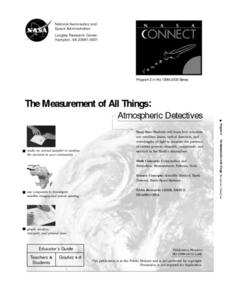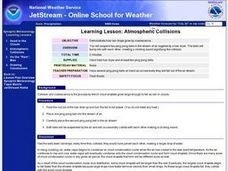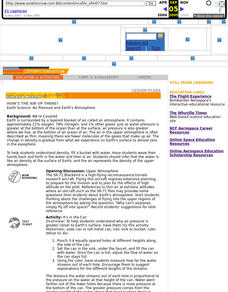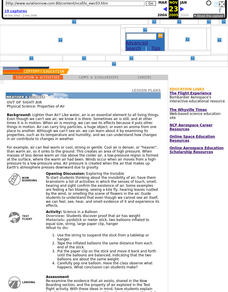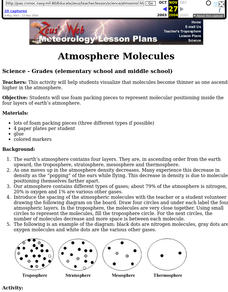Curated OER
The Measurement of All Things: Atmospheric Detectives
Students identify the characteristics of aerosols. Using remote sensing, they participate in an experiment in which they determine how the sun's radiation and elements in the atmosphere interact with one another. They also research the...
Curated OER
Create Your Own Cloud
Students explore and analyze weather conditions, climates, compositions and characteristics of the atmosphere and weather patterns. They explain in detail the water cycle and its relationship to weather patterns. A lab experiment is...
Curated OER
Wind Dynamics and Forests
Students perform experiments to explore differences in wind speed and forest density. Through experimentation and observation, students realize that changes in vegetation affect the atmosphere and wind conditions. They create a model...
Curated OER
How Do They "Whether" the Weather
Sixth graders are engaged in learning about weather systems, weather patterns and how to create a local forecast through a KCTS video called: "How Do They "Whether" the Weather?" Students actively learn how movements in atmosphere are...
Curated OER
The Climate Challenge Game
Students explore climate change, its impacts and possible solutions. They play a television-style quiz challenge game. Students discuss the topics pertaining to global, local, and personal solutions to climate changes.
Curated OER
Atmospheric Pressure
Ninth graders explore the abstract idea of the atom and explain the differences and similarities between solids, liquids, and gases. They understand the molecular differences between solids, liquids, and gases.
Curated OER
The Greenhouse Effect
Students complete a group experiment which simulates the greenhouse effect as well as compare the climate on Earth to the climate on Venus following a class discussion on the greenhouse effect.
Curated OER
Every Breath You Take
Students explore the nature of the air we breathe by observing petri dishes that have accumulated particulate matter from the atmosphere. Students make mathematical calculations and inferences about the effect of this matter on...
Curated OER
Meterology -- Atmosphere
Fourth graders discover how weather predictions are made. They list the responsibilities of a meteorologist. They identify weather instruments and state their functions.
Curated OER
What's Hiding in the Air?
Fifth graders conduct experiments to study the effects of invisible air pollutants including one with a bean plant. They examine methods of invisible air pollutants.
Curated OER
Creating and Analyzing Graphs of Tropospheric Ozone
Students create and analyze graphs using archived atmospheric data to compare the ozone levels of selected regions around the world.
Curated OER
You've Got to See It to Believe It!
Fifth graders examine smog and particulate matter as two major visible air pollutants. They discover how the pollutants formed and how engineers work on visible air pollution. They design an advertisement for a hybrid vehicle.
Curated OER
The Weather Classroom: Atmosphere
Middle schoolers explore the planets and their atmospheres online. They write the story of "Goldilocks and the Nine Planets" to explain how each planet's atmosphere differs from Earth's. They design a viable life form.
Curated OER
Learning Lesson: Atmospheric Collisions
Students participate in a demonstration showing how rain drops grow by coalescence. They use ping pong balls and put them in an air stream. They end the lesson discussing flash flood safety.
Curated OER
Detecting Magnetic Materials in "Martian" Soil
Students simulate some of the Pathfinder experiments by devising methods of collecting and measuring magnetic substances in pseudo-Martian soil. The efficiency of each of the methods used to collect materials is evaluated in this lesson.
Curated OER
Mission Planning: Earth/Mars Comparisons
Students compare and contrast conditions on Mars to those on our own planet, specifically, their local or regional environments. The physical characteristics, the atmosphere, and other astronomical data is considered.
Curated OER
The Air Up There!
Young scholars create a model of a column of air and discover one of the reasons why low and high pressure systems exist and why low pressure is often associated with bad weather.
Curated OER
Acid Rain
Students write paragraphs and color illustrations about acid rain. They color in where gases come from, where they mix, and where they return. They discuss where acids form in the atmosphere and list manmade sources of gases.
Curated OER
Clean Air
Students observe gas molecules in the atmosphere absorbing the light that goes through them.
Curated OER
Alaska's Physical Systems and History
Learners read about Alaska's physical systems and determine how Alaska's physical makeup has impacted its history. They create timelines of their particular physical system.
Curated OER
How's the Air Up There?
Students experiment with soda cans and water to discover why air pressure is greater closer to Earth's surface.
Curated OER
Out Of Sight Air; Weather
Fourth graders conduct an experiment to get them thinking about the invisibility of air, and to prove that air has weight.
Curated OER
Atmosphere Molecules
Students use foam packing pieces to represent molecular positioning inside the four layers of earth's atmosphere. This lesson help students visualize that molecules become thinner as one ascends higher in the atmosphere.


